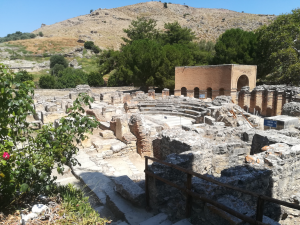Voorsmaakje
Crete, the largest of the Greek islands, has brought to us invaluable evidence on Ancient Greek language and its dialectal diversity. In Crete, we found clay tables with the Linear B script, which provide the oldest written evidence of the Greek language. They date back approximately to the time of the Trojan war, 1200 BC. There, we also found the so-called “Queen of Inscriptions”, the biggest Ancient Greek inscription ever found, dated roughly around 500 BC.
What can these inscriptions tell us about the Ancient Greek dialects spoken in Crete and how they changed, over the thousand years before the arrival of the Romans? And what can these dialects tell us about the speakers’ identity? Cretans had an ambivalent and liminal identity, as islanders often do, also reflected in the resilience of their dialect to external influence. They were indeed viewed with a certain suspicion by other Greeks – Homer himself called Cretans a bunch of thieves and liars, and this fame lasted for a thousand years.

Over de spreker
Dalia Pratali Maffei obtained her BA (2016) and MA (2018) in Classics at Ca’ Foscari University of Venice and later received her PhD title at the University of Cambridge (2023), with a thesis on the dialect of inscribed epigrams, i.e. short poems written on inscriptions. She joined the University of Gent in 2023 as an FWO post-doctoral researcher, with a project on dialect contact between Doric and Koine Greek in the Hellenistic age.
Praktische informatie
Wanneer? woensdag 6 november 2024, om 19u30
Waar? leslokaal 0.4 (Blandijnberg 2, 9000 Gent)
Prijs? gratis voor leden van het Griekenlandcentrum, UGent studenten (m.u.v. PhD-studenten) en scholieren. Anderen betalen €5 aan de kassa.
! Opgelet: deze lezing wordt in het Engels gegeven !